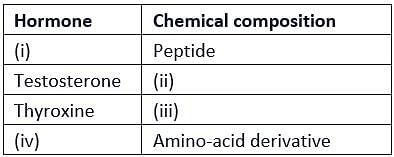NEET Exam > NEET Tests > Daily Test for NEET Preparation > Test: Endocrine Glands and Human Endocrine System (October 5) - NEET MCQ
Test: Endocrine Glands and Human Endocrine System (October 5) - NEET MCQ
Test Description
10 Questions MCQ Test Daily Test for NEET Preparation - Test: Endocrine Glands and Human Endocrine System (October 5)
Test: Endocrine Glands and Human Endocrine System (October 5) for NEET 2024 is part of Daily Test for NEET Preparation preparation. The Test: Endocrine Glands and Human Endocrine System (October 5) questions and answers have been
prepared according to the NEET exam syllabus.The Test: Endocrine Glands and Human Endocrine System (October 5) MCQs are made for NEET 2024 Exam. Find important
definitions, questions, notes, meanings, examples, exercises, MCQs and online tests for Test: Endocrine Glands and Human Endocrine System (October 5) below.
Solutions of Test: Endocrine Glands and Human Endocrine System (October 5) questions in English are available as part of our Daily Test for NEET Preparation for NEET & Test: Endocrine Glands and Human Endocrine System (October 5) solutions in
Hindi for Daily Test for NEET Preparation course. Download more important topics, notes, lectures and mock
test series for NEET Exam by signing up for free. Attempt Test: Endocrine Glands and Human Endocrine System (October 5) | 10 questions in 10 minutes | Mock test for NEET preparation | Free important questions MCQ to study Daily Test for NEET Preparation for NEET Exam | Download free PDF with solutions
Test: Endocrine Glands and Human Endocrine System (October 5) - Question 1
Which of the following is NOT an endocrine gland?
Detailed Solution for Test: Endocrine Glands and Human Endocrine System (October 5) - Question 1
Test: Endocrine Glands and Human Endocrine System (October 5) - Question 2
Hormones secreted by the hypothalamus show their influence on ______.
Detailed Solution for Test: Endocrine Glands and Human Endocrine System (October 5) - Question 2
| 1 Crore+ students have signed up on EduRev. Have you? Download the App |
Test: Endocrine Glands and Human Endocrine System (October 5) - Question 3
Which hormone among these is not secreted by an endocrine gland?
Detailed Solution for Test: Endocrine Glands and Human Endocrine System (October 5) - Question 3
Test: Endocrine Glands and Human Endocrine System (October 5) - Question 4
Erythropoietin stimulated by the juxtaglomerular cells is a ______.
Detailed Solution for Test: Endocrine Glands and Human Endocrine System (October 5) - Question 4
Test: Endocrine Glands and Human Endocrine System (October 5) - Question 5
Endorine glands have___ to carry their secretions to the specific organ.
Detailed Solution for Test: Endocrine Glands and Human Endocrine System (October 5) - Question 5
Test: Endocrine Glands and Human Endocrine System (October 5) - Question 6
Chemically, hormones are
Detailed Solution for Test: Endocrine Glands and Human Endocrine System (October 5) - Question 6
Test: Endocrine Glands and Human Endocrine System (October 5) - Question 7
The given table enlists various hormones and their chemical nature. Select the option which completes the table.


Detailed Solution for Test: Endocrine Glands and Human Endocrine System (October 5) - Question 7
Detailed Solution for Test: Endocrine Glands and Human Endocrine System (October 5) - Question 8
Test: Endocrine Glands and Human Endocrine System (October 5) - Question 9
All hypophysiotropic hormones are peptides except
Detailed Solution for Test: Endocrine Glands and Human Endocrine System (October 5) - Question 9
Test: Endocrine Glands and Human Endocrine System (October 5) - Question 10
Which of the following hormone is steroid?
Detailed Solution for Test: Endocrine Glands and Human Endocrine System (October 5) - Question 10
|
12 docs|366 tests
|
Information about Test: Endocrine Glands and Human Endocrine System (October 5) Page
In this test you can find the Exam questions for Test: Endocrine Glands and Human Endocrine System (October 5) solved & explained in the simplest way possible.
Besides giving Questions and answers for Test: Endocrine Glands and Human Endocrine System (October 5), EduRev gives you an ample number of Online tests for practice



















